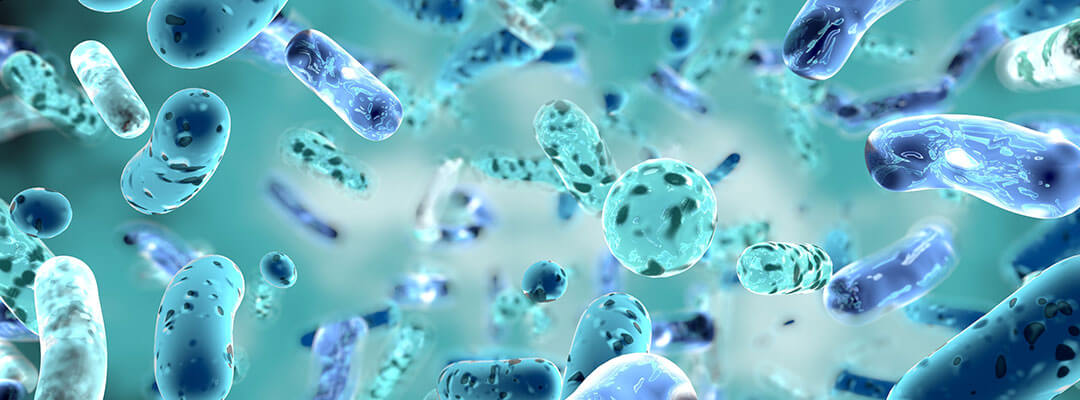Did you know that that taking probiotics for hormone balance can restore health and vitality?
We most often (if not always) associate probiotics with our gastrointestinal tract and something you may only need for irritable bowel syndrome or other gut-related issues.
It’s well-known that poor gut health can come with a whole host of issues for your digestive system and overall health. What you may not have realized, however, is that what’s going on in your gut turns out to have a huge impact on your hormonal health as well.
The little bugs hanging out in your belly have the power to affect your hormonal balance. A shift either way – whether too much or too little of your healthy gut bacteria, can lead to excess hormones and hormonal fluctuations throughout your body.
In this post we’ve put together an easy-to-understand guide that covers what hormones are, how probiotics work, and how they link together in a gut-hormone connection.

What Are Hormones?
Hormones are your body’s communication system. They are chemical messengers that travel to all areas of your body via your bloodstream, and they tell your organs and tissues what do to and when.
A common misconception is that hormones are only relevant to puberty or women’s health. The reality is, that there are hormones for many different (and very important) processes in our bodies. In fact, hormones control all aspects of our health and are essential for our survival.
Hormones are produced by our endocrine system which includes:
- Hypothalamus
- Pituitary gland
- Adrenal glands
- Gonads (ovaries and testes)
- Thyroid gland
- Parathyroid gland
- Pancreas
We need key hormones to manage hundreds of our body’s functions, including:
- Metabolism
- Blood pressure
- Blood sugar regulation
- Mood
- When we sleep and when we wake up
- Growth and development
- Sexual function
- Reproduction
When you have either too much or too little of any hormone, an imbalance results. Even just a minor fluctuation in hormone levels can be noticeable and require treatment.
Hormone imbalance can lead to a myriad of symptoms and conditions:
- Diabetes (Type 1, Type 2, and gestational)
- Hypo- and hyperthyroidism
- Female infertility
- Male infertility
- Polycystic ovarian syndrome
- Acne
- Thyroid disease
- Obesity
- Depression and anxiety
- Fatigue
- Vaginal dryness
- Constipation or diarrhea
- Tachycardia
- Dry skin and hair
- Sensitivity to hot and cold temperatures
- Elevated cholesterol levels
What Are Probiotics?
Probiotics are live microorganisms (including bacteria and yeast) that are believed to provide health benefits when they are consumed or applied to the body. The most common bacteria found in probiotics belong to the Lactobacillus and Bifidobacterium groups. A common yeast found in probiotics is Saccharomyces boulardii.
Probiotic-rich foods such as fermented foods and vegetables, as well as yogurt, are a good source of healthy bacteria. High-quality probiotic supplements consisting of multiple bacterial strains are another great source of healthy bacteria.
How Gut Health Impacts Your Overall Health
While most people may associate the gut with their stomach, the term refers to a set of organs that includes the stomach, small intestine, and large intestine, amongst others. The gut microbiome, resides in your small and large intestines. It consists of trillions of microbes including bacteria, fungi, yeasts, and viruses.
This gut flora helps you digest food, supports your immune health, heart and brain health, and may help control blood sugar.
Your gut health is tied to both your physical and mental health, and the gut is often referred to as our second brain. It’s not hyperbole to state a healthy gut microbiome is a healthy you, head-to-toe. Keeping your gut bacteria balanced, well-fed, and happy will have you feeling and functioning at your best. On the flipside, when your friendly flora get out of balance (known as gut dysbiosis), you will most likely experience undesirable symptoms or conditions.
An unhealthy gut can lead to:
- Constipation
- Diarrhea
- Gas
- Bloating
- Heartburn
- Fatigue
- Poor sleep
- Food intolerances
- Sugar cravings
- Weight gain or loss
- Skin conditions, such as eczema, acne, or psoriasis
- Autoimmunity
- Leaky gut
- Anxiety and depression
What causes poor gut health?
- Medications such as antibiotics
- Poor sleep quality
- Sedentary lifestyle
- Stress
- Excessive alcohol intake
- Lack of a diversified, whole foods diet
- Low intake of fiber
- Cigarette smoking
Probiotics for hormone balance – how does that work?
The gut microbiome has been linked to hormonal balance as well as vaginal health. An imbalance in your gut bacteria is correlated to an imbalance in your hormones.
In your microbiome there are specific strains of bacteria that specialize in breaking down estrogen. These bacteria are responsible for how your body metabolizes estrogen and regulates your estrogen levels. If they are dysfunctioning and an imbalance occurs, this can lead to excess estrogen in your body, known as estrogen dominance.
A study published in 2016 in the Journal of the National Cancer Institute found that probiotics may be used as an intervention to target a specific enzyme (beta-glucuronidase) what is produced by the microbiome. This enzyme affects estrogen levels and can lead to estrogen dominance or deficiency when gut bacteria is imbalanced and estrogen metabolism is affected.
Elevated levels of beta-glucuronidase are also associated with endometriosis. Endometriosis is linked to excess estrogen in the body and a study published in 2002 in Human Reproduction found a link to gut imbalances. A separate study published in the International Journal of Molecular Sciences in 2021 found that a Lactobacillus probiotic taken orally alleviated endometriosis-related pain in women, and even reduced lesions in mice and prevented its growth in rats.
Probiotics are also proven to be beneficial for women suffering from polycystic ovary syndrome (PCOS). A study published in 2018 in the Archives of Iranian Medicine found that twelve weeks of administering an oral probiotic supplement reduced high testosterone levels, which is associated with PCOS.
An imbalance in gut microbiota has also been linked to various forms of cancer in women including, breast, endometrial, cervical, and ovarian cancers. Research has found gut imbalances due to excess estrogen in cancer patients compared to the healthy control subjects.
An imbalance in gut microbiota may also be linked to prostate cancer in men. A study published in the International Journal of Urology in 2022 suggested probiotics may prevent or delay prostate cancer development as the gut microbiota are a source of testosterone.
Summary
In summary, do you need probiotics for hormonal balance? Well, yes, especially if you’re experiencing any hormonal imbalances or issues listed above. Microbiome diversity is the key to a healthy gut, and the best way to ensure that is to diversify your food intake. Eat the rainbow of vegetables, fruits, cruciferous vegetables, complex carbohydrates, add some fermented foods to your diet, and cut down on sweeteners and refined sugars.
Sometimes oral probiotics supplements or a probiotic blend may be of help as well. If you’re looking to build up your gut health to support your hormone balance and overall health, a myPrimalCoach can help guide you with any dietary changes, and ensure you incorporate the best sources of different bacteria on your plate.

